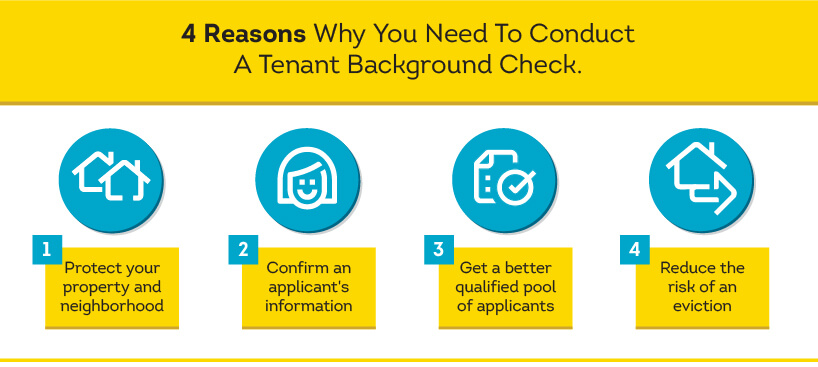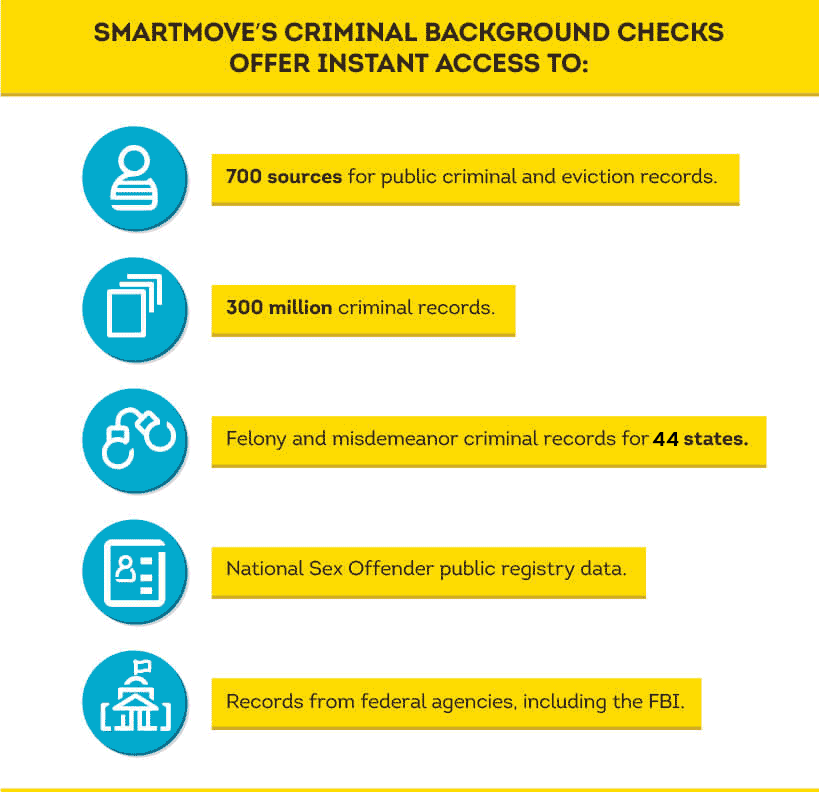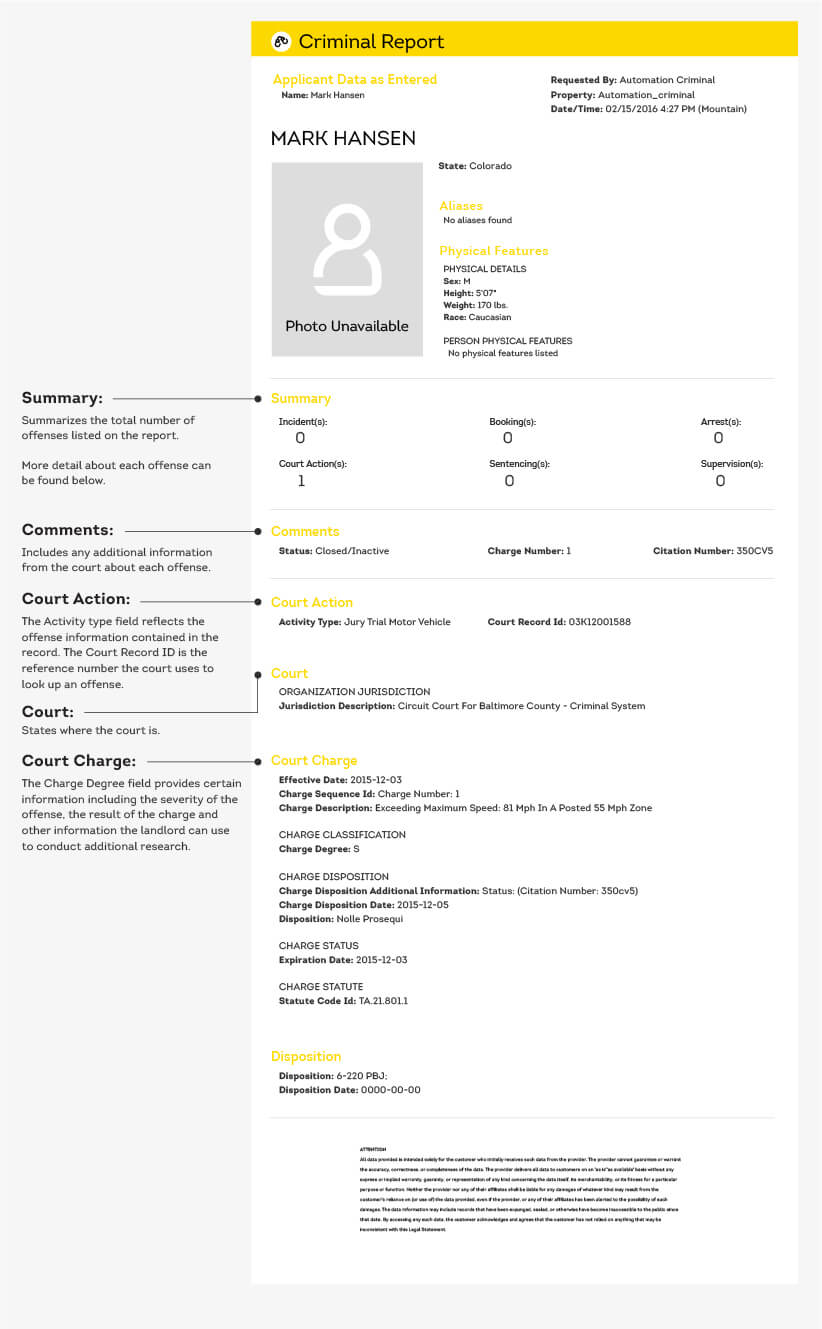Disclosure:
This content, except as otherwise indicated or stated on this site, is the property of TransUnion Rental Screening Solutions, Inc. This content is for educational purposes and for convenience only. Trademarks used are the property of their respective owners, and no endorsement or affiliation is implied. The information presented in this content is “as is” without warranties of any kind, and specifically is not represented to be complete and does not constitute legal advice, and is subject to change without notice. You are encouraged to check these terms from time to time for changes, and by accessing this site you agree to these terms and all terms listed. Laws and regulations may vary by state and locality. Consult your own counsel if you have legal questions related to your rental property practices and processes.
A complete tenant screening is one of the most crucial steps to finding a good tenant and weeding out tenants that do not qualify for your property. When you consider that nearly 1 in 5 people screened by SmartMove had a criminal hit on their record in 2015, you can see how important it is to conduct a background check as part of your tenant selection process to identify relevant criminal records.
By conducting a background check on your prospective tenant, you can help avoid putting your property and the neighborhood at risk. A background check is a necessary part of a full tenant screening process that should also include a landlord credit check (to give you the financial picture on your tenant) and an eviction report (to get more insight into their rental history). Reviewing an applicant’s credit, criminal and eviction history gives you a more well-rounded view of who they are, their ability to pay, and the relevant risks associated with renting to them.
But what does conducting a tenant background check really entail? Let’s take a look at the process below.
First of all, let’s review the primary reasons you can’t afford to skip a criminal background check:

1. Protect your property and the neighborhood
A background check can help you answer questions like:
- Does the person’s record have a relevant felony conviction?
- Is the person listed on a sex offender registry?
- Does a prior relevant conviction indicate the applicant could put the building or neighborhood at risk?
Getting answers to these questions can give you peace of mind and help you protect your property, the neighborhood, and yourself.
2. Confirm an applicant’s information
According to our 2016 Smart Move survey, 86% of landlords will verify an applicant’s information, and with good reason. A background check will help you verify that the information the applicant gave during their initial screening is correct. If an applicant tells you that you their background check is clear, it’s a good idea verify this fact by ordering a background check on them. It’s not wise to simply take an applicant at their word or to rely on a gut feeling, because they may fail to disclose a relevant criminal conviction. Confirming an applicant’s information with a criminal report is a helpful way to verify their history.
Along with the credit check, a tenant background check helps you to confirm your applicant’s information. Since SmartMove is powered by TransUnion, it can find more records that potentially match your applicant by supplementing the applicant’s own information with data from TransUnion’s databases (such as a middle name, previous address, or date of birth) to enrich record searches. Additionally, TransUnion’s enhanced matching logic utilizes over 40 years of TransUnion’s subject matching expertise to more accurately match potential records to your applicant.
3. Get a better qualified pool of applicants
You can weed out people with relevant criminal records before they even apply by stating your requirements upfront in your ads and during initial conversations with applicants. Often people with relevant criminal records will avoid applying if they know there is a background check involved. This enables you to attract a smaller (but better qualified) pool of applicants to your rental.
4. Reduce the risk of an eviction
It is your responsibility to choose tenants who don’t put you or your neighborhood at risk of violence or theft. A criminal report will help you to see if you’re renting to a person who could put your property or the neighborhood in jeopardy. If you skip a background check, you could end up with a tenant that you have to evict later on -- an expensive mistake that could have been prevented by completing a background check on the tenant in the first place. This can cost you money, effort, and time you may not have.
Expenses extend farther than the cost of the eviction itself, including:
- Maintenance fees
- Lost rent
- Court costs
- Filing costs
- Judgement costs
- Unit turnover costs
Total eviction expenses cost $3,500* on average and the process can take weeks or months to complete, depending on where your property is located. Many independent landlords don’t have this kind of time or money.
In addition to a criminal report, it’s important to order an eviction report as part of your tenant screening package to see if the applicant has been the subject of eviction-related court actions in the past. An eviction history can be telling since prior evictions are highly predictive of future evictions. When you consider that an eviction could be prevented with a thorough tenant screening before they move onto the property, it’s just not worth the risk of skipping the screening step.
Staying compliant with laws and regulations

When reviewing criminal records, it’s important to take an individualized approach to each applicant. Consider HUD’s recent guidance to landlords on taking adverse actions based on an individual’s criminal history. Not all hits on criminal records are deal-breakers.
A 2016 SmartMove survey also showed that 44% of landlords strongly and somewhat disagree that they’d be willing to overlook some relevant criminal history issues if the tenant has an explanation. Once you have a criminal report, you can consider the nature, severity, and timing of any criminal convictions to make a case-by-case decision.
SmartMove makes use of advanced filters and industry best practices to provide a solution consistent with its obligations under the Fair Credit Reporting Act (FCRA) and related state laws. Powered by TransUnion, SmartMove searches databases including:
- 44 state criminal databases
- Most Wanted databases
- National Sex Offender Public Registry
As a result, landlords benefit from a search encompassing nearly 300 million criminal records from both state and national databases.
As always in your dealings with applicants and tenants, you must be aware of any laws and regulations that you’re subject to. Consult an attorney to determine whether you are subject to the Fair Housing Act or any other applicable laws. Your state may have specific guidelines when it comes to requesting criminal background information for rental purposes.
How to conduct a background check
You want to be sure that you perform a comprehensive background check so you can get the full picture on your applicant. One of the easiest ways to do this is to use a tenant screening service such as SmartMove. By using an online tenant screening service you get results in minutes. The results are available 24/7 for viewing, allowing you to access the information whenever it’s most convenient for you.

TransUnion SmartMove criminal background check process is quick and efficient, getting you the results you need in a hurry. SmartMove’s criminal background checks offers access to:
- Almost 700 sources for public criminal and eviction records, including nearly 300 million criminal records
- Felony and misdemeanor criminal records from state and local jurisdictions in 44 states*
- The National Sex Offender public registry data
- Records from federal agencies, including the Drug Enforcement Administration, the FBI, Homeland Security, the Bureau of Alcohol, Tobacco, Firearms and Explosives, U.S. Marshals, the U.S. Secret Service, and the U.S. Treasury Office of Foreign Assets Control
*Criminal results not available for Delaware, Hawaii, Kentucky, Massachusetts, New Jersey, South Dakota, Wyoming and Cook County, Illinois.
What should you look for
Every landlord will have their own criteria for what offenses are acceptable. Here’s how you can read a SmartMove criminal report.

Conduct a background check as part of a complete tenant screening
In addition to screening for criminal history, you should also check your applicants’ credit and eviction history for a more complete picture of their background. This information will help you determine whether their current financial situation and past rental history aligns with your rental criteria. You may also want to check your applicant’s income and references. Ask to see current pay stubs as proof of current income, and have an actual conversation with their employer and prior landlords. You can even ask to see bank statements or rental receipts to double check that they have a history of paying their rent on time.
Conclusion
Having an accessible, affordable tenant screening service with a detailed background check is important when you're looking for tenants for your rental property. Without conducting a complete tenant screening, there’s no true way to know whether or not they’re going to respect your property and other residents.
Armed with the information provided by TransUnion SmartMove online tenant screening you can make more informed decisions about applicants which will ultimately protect yourself, your property and the people in the neighborhood.
*Based on SmartMove customer experiences
Know your applicant.
Additional Disclosure:
Remember that this material is intended to provide you with helpful information and is not to be relied upon to make decisions, nor is this material intended to be or construed as legal advice. You are encouraged to consult your legal counsel for advice on your specific business operations and responsibilities under applicable law. Trademarks used in this material are the property of their respective owners and no affiliation or endorsement is implied.



